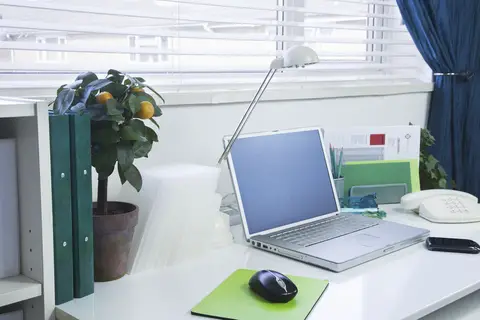The U.S. Small Business Administration says that 52% of all businesses in the U.S. are home-based. If you’re one of them, planning to become one of them, or merely work from home occasionally, make sure you set up your office for best results.
Here are 5 areas to address.
1. Make sure it’s legal
Before you decide to operate a business from your home, be certain that it’s permissible. Freelance writers, tutors, and therapists usually don’t need to worry about local zoning laws on running a business in residentially-zoned areas. However, some types of businesses may not be allowed. If a home-based business is legal, find out whether there are any licenses or additional taxes you need to address.
Find out about signage from your municipality. Hanging out a shingle may be fine, it may be barred, or the size of your sign may be limited.
If you have a homeowners association, be sure you’re operating within its rules. While your city or town may not frown on a home-based business, your neighbors might.
2. Pick a spot
The importance of location, location, location isn’t only for buying a home; it’s also for situating your home office. Depending on the size of your home, it may be a spare bedroom, a den, or a corner of a family room. Here are some considerations for choosing your spot:
- Find enough room for your business needs. If you’re just sitting in front of a computer, a small area to accommodate a desk may be fine. If you’re a designer and need a drafting table or other large space for your equipment, a small area won’t due. Determine up front what you need in your office so you can designate the right amount of space.
- Consider tax results. If your home is your principal place of business or a place to meet regularly with customers or clients, be sure your home office is used exclusively for business so you can deduct related costs. A kitchen table won’t work taxwise because of personal/family use of the area. A separate structure, such as a separate garage that’s been converted to a studio or a greenhouse, may fit the bill. Check tax rules for the home office deduction from the IRS.
3. Outfit your office
Be sure your space has all the things you need for your business activities. At a minimum, you’ll likely need a desk, good chair, paper, and other supplies. I’ve partnered with Staples to inform home-based business owners about being able to use Staples® Brand Products to meet their needs regardless of their budgets. For example, the Staples® Vexa Mesh Chair provides customized comfort while fitting easily into a small space and a tight budget.
You’ll also need office supplies as well as storage solutions to stash your items neatly. For example, if you need to highlight text in articles related to your business like I do, a supply of Staples® Hype! Pen-Style Highlighters is essential. And keeping them and other items (e.g., multipurpose paper, Post-its, and paper clips) organized and easily accessible can be done with Staples® 40 Quart Plastic Container.
4. Get hooked up
Almost every business today needs Internet access, and residential options for personal purposes may not be sufficient. Determine whether business solutions from your local providers are needed because of speed or reliability. You’ll likely pay more, but it’s a cost of doing business.
Be sure that you keep your mobile devices up and running so you can jump on the Internet when you need to. Staples® Three Device Rapid Wall Charger (SKUs- 2094917 for white and 2094932 for black) enables you to simultaneously charge three devices in your home office; Staples® Dual Device Rapid Car Charger lets you recharge your smartphone and tablet while on the road.
5. Check insurance coverage
Don’t assume your homeowners or renters policy covers your home office. Check your existing policy to learn whether you have liability coverage for accidents that may befall business visitors, such as clients or customers, or even delivery people. Also find out whether you have property coverage for losses to business items, including expensive equipment, and if so, what’s the extent of your coverage.
To protect yourself, you may be able to add onto your existing policy to cover your business needs. This is done through an endorsement or rider, and an additional premium.
Or you may need a separate business owners policy (BOP) for your liability and property protection. This type of policy also can cover records protection so if, for example, a fire destroys them, insurance proceeds can help to recreate them.
Conclusion
Working from home may be an ideal solution for your business and personal needs. I’ve done it for more than 30 years and still love it. But be sure to consider all of the ramifications of your decision so that the arrangement will turn out to be successful for you.
This post was created in partnership with Staples. All opinions expressed in the post are my own and not those of Staples.



